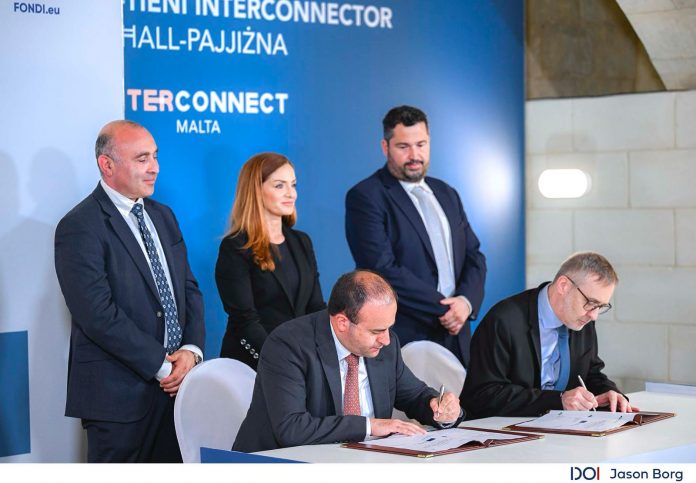
The Maltese Government and the Norwegian company Nexans AS have signed the contract for the manufacturing and installation of the sub-sea cable. The second inter-connector project, with a total value of around €300 million, is a co-financed project by the European Union and is considered a project of strategic importance, by the EU itself.
During the signing ceremony, which was open to the press, Minister for Environment, Energy and Public Cleanliness Miriam Dalli emphasised, “This is a project that will enhance our electricity distribution network. A project that will help us sustain other changes we have started and will continue with even more strength. This is an investment that will facilitate the transition towards a carbon-neutral economy and will allow for more renewable sources in our country as well as the importation of electricity from renewable sources.”
Minister Miriam Dalli explained that having two interconnectors instead of just one will provide greater peace of mind. “Challenges arise and accidents do happen. So, we are strengthening the security of our country’s energy supply.”
The signing of the agreement with Nexans marks a significant milestone for the second interconnector project, also known as IC2. The contract is one of six major tenders related to this project and covers the manufacturing and installation of the 245kV submarine cable between Malta and Sicily. The subsea cable is 99km long.
The contract was signed by Adrian Dalli, Director General from the Department of Contracts and Yvan Duperray, Vice President Marketing and Sales from Nexans.
Interconnect Malta’s Chairman of the Board, Perit Godwin Agius stated, “Today’s agreement represents a key milestone that brings us closer to the implementation of the second inter-connector. An agreement that transforms years of planning, design, permitting, and hard work into a concrete step forward. Interconnect Malta is pleased to note that during the tendering procedures, there was strong participation from industry giants, fostering robust competition.”
IC2 is part of a broader chain of initiatives that the Energy Ministry and Government are undertaking for Malta to reach its de-carbonisation targets as part of the 2050 vision. This project will strengthen security of supply by doubling Malta’s current interconnection to the European network. At the same time, it will allow for greater investment in renewable energy by providing the necessary reserve capacity to address the intermittency of renewable energy, including offshore sources. Through the project’s Cost Benefit Analysis, the second inter-connector is expected to reduce CO2 emissions by 13.5 million tonnes.
![]()







